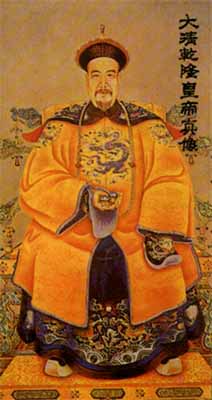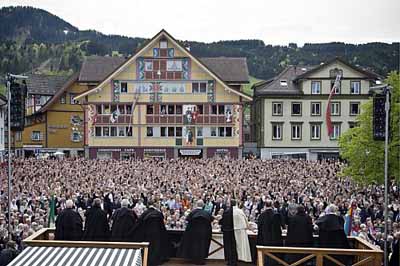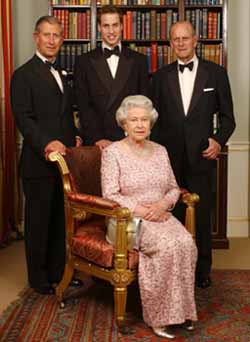 |
Organic Society
Monarchy, Aristocracy & Democracy - I
Definitions, Examples, Nuances
Plinio Corrêa de Oliveira
For your formation and to prepare you against the attacks of our enemies, I deem it useful to explain some basics on the different forms of government.
You know that our apostolate has a civic character. It is turned toward the reorganization of society under Catholic inspiration. When I say society, this includes the State, which is an expression of society. To be oriented toward the proper organization of society means to fight for a culture, art, laws and all aspects of temporal life to be inspired by Catholic doctrine. It is also to provide for the spiritual and moral formation of society, which is absolutely necessary for a well-organized temporal order.

Chinese Emperor Qianlong (1711-1799), an example of an absolute monarch |
Our presupposition is that the departure point for building a Christian Civilization is Catholic doctrine and the love of God. Therefore, the foundation for any social, political, cultural or even economic work is the Catholic Religion. Thus, our efforts are profoundly impaired by currents that either present a deformed religion or support a non-Catholic society and State.
Therefore, we have two battlefronts:
- We fight to restore the integrity of religion, and we clash with the Progressivists who want to falsify the Catholic Church;
- We fight to restore the integrity of Christian Civilization, and we clash with those who defend an anti-Christian civilization.
These are our two lines of action and our two principal adversaries.
I will begin today with the analysis of the temporal sphere and the three forms of government a society can have. My goal here is not to make an exhaustive analysis of this topic, but an invitation for you to study it further.
But first, I want to address an accusation frequently made against us: that we are unrestrictedly favorable to monarchy and that we work for the restoration of monarchy in Brazil and other countries.
This is a baseless accusation. We do not fight for the restoration of monarchy nor do we consider it applicable in our countries in today’s historic context. We believe it would not be a good solution for our countries.
Since I am addressing this accusation and I just reaffirmed that we do not want to restore the monarchy, let me look at what monarchy is - as well as the other forms of government.
Monarchy is government by only one. Mono means one, archia means government, power, authority. In a monarchy only one has authority. Aristocracy is government by a group. Democracy is government by the people. These are the three forms.
Now, these are the three forms of government in theory, in their pure form. There are also mixed forms of government. A country can be monarchic and aristocratic when the power to govern is distributed between one person and a group. It can be aristocratic and democratic when there is a small group that exercises part of the authority and the people assume another part. It can be monarchic, aristocratic and democratic when different parts of the power belong to one, a group and the people respectively. In practice, these three pure forms of government can be mixed and combined at the convenience of each country.
Examples of each type
Characteristic examples of pure monarchies are the Chinese monarchy or the Turkish monarchy in relatively recent times or the pagan monarchies of Antiquity. They were absolute monarchies where only one had all the power. Below the supreme ruler were different social classes, but the emperor, king or pharaoh had complete command over everyone and they could do whatever they wanted, however they wanted.
The Republic of Venice until the late 18th century was an example of an almost pure aristocracy. The city of Venice, a small territory, was a sovereign independent nation governed by an aristocracy, an ensemble of noble families. The members of its Great Council elected one of its members as its president through an intricate procedure. He had the title of Doge, which is the equivalent of Duke, but different in that it was a lifetime title that was not hereditary.

An annual meeting in the city of Appenzell, Switzerland, where the people decide directly on public issues |
Pure democracy still exists is some villages of Switzerland. For example, not long ago a village voted on whether to give the right to vote to women. An official assembly was called: All the men of the village gathered in the public square to discuss the pros and cons of women voting and they came to a decision. They rejected the right for women to vote for reasons synthesized in this picturesque formula: Kirche, kind & küche (church, children & kitchen). That is to say, women should not concern themselves with public affairs, but rather go to church and stay at home to care for the children and cook. This way of determining the destiny of their village exemplifies what a pure or direct democracy means.
The North American democracy pretends to be a perfect democracy, but it is not. Such pretension is a fiction. Its political system is controlled behind the scenes by powerful religious, cultural and economic oligarchies that oblige the politicians to follow their orientations.
An example of a mixed form of government is the English monarchy. The power of the Queen is very small; the House of Lords, composed of nobles, has also a small amount of power; the House of Commons, which is elected by the people, has almost all the power. This was the English reality about 100 years ago. Today, the power of the Queen is becoming merely symbolic; the power of the Lords, practically nonexistent, tends to disappear.
Nuances in the forms of government
Can we say that the definition of monarchy as being the government of only one is entirely objective? In thesis, yes, we can. In practice, however, we see that every one of the monarchies was actually the government of a family. According to the different historic origins, it could be summarized as follows: An individual receives the power of a country, which he passes on to his son, who passes it to his own son. Through inheritance his family becomes the source of new monarchs, and the reigning family becomes a dynasty. In practice, therefore, monarchy is the government of a family.

Three generations of the Royal Family of Windsor give stability to the English Crown |
Is aristocracy really the government of a few? Actually, aristocracy is the government of those who are most capable to govern, persons with broad horizons and strong wills who from youth have received a formation that prepared them to govern.
Napoleon affirmed that the formation of a child starts 100 years before his birth. I believe he could have extended that time much further. In our formation we receive in an indistinct way the influence of our ancestors of many generations past. For this reason, there are individuals who are better formed to govern than others. But aristocracy is not just the government of a group of individuals, but of a group of families who are more capable of governing.
Democracy, according to the maxim of the French Revolution is the government of the people, by the people and for the people. What is the government of the people? The direct government of the people is the one exemplified by that Swiss village I mentioned. Other small villages can have similar ways of applying direct democracy.
Another way to exercise direct democracy is the referendum or plebiscite, sometimes used in indirect democracies. If I am not mistaken, it was the Swiss also who set the model for the referendum. In it the people are addressed directly to decide whether they want this or that law. The law only goes into effect if it is approved by the people.
In the Middle Age there was a way of exercising democracy that has practically disappeared today, one called consuetudinary law. Consuetudo in Latin means custom, habit. So, consuetudinary law was that born from the customs of the people in a particular area. An established custom would automatically become law.
For example, today labor laws are normally drawn up either by the government or a chamber of representatives, and both employers and employees have to obey them. In the medieval guilds the laws were born from the day-to-day customs of the workers. When a custom was well established and accepted by all and had become a tradition, it would automatically become a law. It was a type of democracy that did not need representatives or senators to approve laws.
Corruption of these forms
When a monarchy is corrupted, when the king governs against the common good of the people, it becomes a tyranny.
When a governing group transgresses the interest of the common good, it becomes an oligarchy.
When the people govern against their own common interest, it becomes a demagogy. There are two types of demagogues. One is an individual who incites the passions of the multitude that lead to the destruction of the State. For example, Salvador Allende in Chile was a demagogue. He incited the poor classes to steal the money of the wealthy class, First, this was a violation of the right of property of the rich; second, it instigated a class struggle that led both the rich and the poor into misery.
Another form of demagogy is when the worse elements of the people usurp the power of the government. For instance, Robespierre, Danton and Marat were infamous characters who rose to power because of the corruption of the revolutionary part of the French population. This is an example of demagogy.
Continued

Posted November 3, 2010

  | | Prof. Plinio |
Organic Society was a theme dear to the late Prof. Plinio Corrêa de Oliveira. He addressed this topic on countless occasions during his life - at times in lectures for the formation of his disciples, at times in meetings with friends who gathered to study the social aspects and history of Christendom, at times just in passing.
Atila S. Guimarães selected excerpts of these lectures and conversations from the trancripts of tapes and his own personal notes. He translated and adapted them into articles for the TIA website. In these texts fidelity to the original ideas and words is kept as much as possible.

Related Topics of Interest
 A Participative Society A Participative Society
 What Is the Res Publica? What Is the Res Publica?
 How Intermediary Societies Participate in the State Power How Intermediary Societies Participate in the State Power
 Oligarchies and Modern Democracies Oligarchies and Modern Democracies
 The Organic Formation of a Region The Organic Formation of a Region
 All Classes Should Have Elites All Classes Should Have Elites
 Different Types of Nobility Different Types of Nobility
 Clans and Human Types Clans and Human Types

Related Works of Interest
|
|
Organic Society | Social-Political | Home | Books | CDs | Search | Contact Us | Donate

© 2002-
Tradition in Action, Inc. All Rights Reserved
|
 |
|